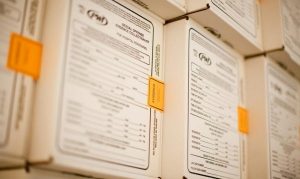Forensic Labs and Advocacy Groups Work Together to End Backlog

Prosecuting sexual violence offenders and achieving justice for survivors relies heavily on DNA evidence. The collection and storage of DNA evidence have been mishandled in the past, creating widespread obstacles in prosecution.
The accumulation of unanalyzed sexual assault forensic exam evidence collected after sexual assaults is referred to as the rape kit backlog. This backlog can usually be attributed to several causes. Many times, evidence was never sent to the crime lab after being collected. States nationwide have found DNA evidence waiting in storage after being collected by law enforcement during sexual assault forensic exams. This “hidden backlog” has resulted in tens of thousands of unprosecuted sexual assault cases.
In other cases, law enforcement sent evidence to crime labs, but it was never tested. Oftentimes, the volume of rape kits exceeded the labs’ ability to test, process, and profile the evidence. In these cases, the rape kits sit in storage at crime labs, sometimes for years.
To prosecute sexual assault cases, DNA must be collected directly from crime scenes during forensic exams. Then, crime labs analyze DNA samples to determine whether the evidence can be used to identify and prosecute an offender. After conducting DNA testing, crime labs create a DNA profile unique to each person. These profiles contain no personally-identifying information. The IDs are entered into CODIS, the FBI database of DNA samples.
Whenever a DNA profile is added to CODIS, its effectiveness increases. Today, CODIS includes more than 10 million DNA profiles. This has increased the percentage of times law enforcement finds a match between DNA found in a rape kit or a crime scene and someone in the database.
In 1999, New York City announced the discovery of 17,000 untested rape kits in storage facilities across the city. The city’s district attorney, Cyrus R. Vance, Jr., announced in 2015 the distribution of approximately $38 million in grants in 20 states to test and process this backlog of rape kits, helping prosecute criminals and bring justice to survivors. Additionally, the Bureau of Justice Assistance (BJA) committed to a $41 million investment to rape kit backlogs across the country. Combined, the two programs paid for the testing of more than 70,000 backlogged rape kits.
The Joyful Heart Foundation acted as technical advisor for the distribution of the grant program by the District Attorney of New York. Founded by Mariska Hargitay, an actress on the popular television series Law & Order: Special Victims Unit, the Joyful Heart Foundation provides victim support and raises awareness around the topic of sexual abuse and assault.
The organization focuses primarily on researching to identify the extent of rape kit backlog, as well as to increase public awareness and engage communities and public officials in conversation. The Joyful Heart Foundation also advocates for legislation and policies that ensure greater access to justice for sexual assault survivors.
For more information about the Joyful Heart Foundation’s policy and advocacy work or to learn more about the rape kit backlog in the United States, visit www.endthebacklog.org.
